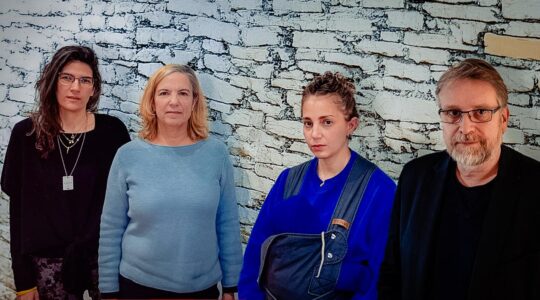LONDON (JTA) — En route to London, Israeli Prime Minister Benjamin Netanyahu said he would use his meeting with British counterpart Theresa May to tighten the trilateral alliance with Britain and Washington.
Netanyahu made the statement Sunday, one day ahead of his first meeting with May, a right-wing leader who replaced David Cameron last year following the referendum vote to leave the European Union, and one week before his first meeting with Donald Trump since his election as president of the United States.
In a statement that did not hide Netanyahu’s satisfaction with the transitions of power in Washington and London, Netanyahu spoke of “opportunities [that] stem” from the changes.
In his meetings with May and Trump, Netanyahu said he would speak about “tightening relations, between each side and Israel and trilaterally.”
Iran, Netanyahu added, is “trying to test the boundaries with extraordinary aggression, gall and defiance.” With the United States in the lead, Israel and the United Kingdom need to “line up together against Iran’s aggression and set clear limits to it,” Netanyahu said. He also called Iran’s missile testing in recent weeks “a challenge.”
Netanyahu had planned to meet May in Switzerland in January but cancelled over Britain’s role in drafting a U.N. Security Council resolution condemning settlements that passed in December.
However, the British move was atypical for the United Kingdom government under May, according to Jonathan Arkush, the president of the British Board of Jewish Deputies, who addressed this subject during a lecture Saturday at the Limmud FSU Europe conference for Russian-speaking Jews in Windsor.
He cited news reports saying that May was in the dark about the involvement of the Foreign Office under Boris Johnson in drafting the resolution.
The event in Windsor by the Limmud FSU Jewish learning group centered on the Balfour Declaration, a short statement by the British government published 100 years ago which favors the establishment in the Land of Israel of a national home for the Jewish People.
The declaration is named after Arthur James Balfour, who was foreign secretary in 1917.
On Sunday, his great-grandson, Lord Roderick Balfour, who had never before made a public statement about the declaration, said in a statement that his family is proud of the statement.
“My family is very proud of the importance to Jewish people everywhere of this initiative by the British government of the day,” the younger Balfour wrote.
JTA has documented Jewish history in real-time for over a century. Keep our journalism strong by joining us in supporting independent, award-winning reporting.





